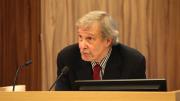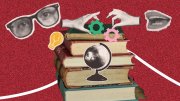Amid all the naysaying and upbraiding and doom-forecasting directed at the humanities, Harvard president emeritus Neil Rudenstine (a poetry scholar) offered a restrained, if comparatively sober, assessment: they are, in his view, “somewhat under siege.”
At Harvard’s Dumbarton Oaks in Washington, D.C., on October 27, Rudenstine delivered a talk that mingled his manifold perspectives (administrative, personal, professorial) to assess that most ossified of dilemmas: the state of the humanities. His address inaugurated a speaker series meant to accompany the institution’s new fellowships, which are aimed at exposing recent Harvard graduates to humanities careers by placing them with partner cultural institutions. Calling the fellowships “timely and important,” Rudenstine prefaced his lecture, before an audience of Dumbarton Oaks affiliates and guests from other D.C.-area museums, by stressing the significance of the work of all humanists: “The world needs you, because without the kind of scholarship you are doing and will be doing, civilization itself is diminished.”
It was a broad stroke at the start of a talk that more frequently sought to justify the humanities on a personal level—and in a speech studded with quotations, Rudenstine chose to begin with a sturdy dictum by Samuel Johnson: “Curiosity is man’s first great passion, and his last.” Much of the ensuing talk seemed structured by this innate curiosity: ardently discursive and frequently playful in tone, the remarks leapt from anecdote to citation, at times dwelling on the essence of humanistic knowledge, yet always returning to the individual experience of humanistic study.
The humanities, “my own personal way”
The bulk of pro-humanities argumentation, as Rudenstine pointed out, tends to hinge on the practical utility of humanistic studies, a claim that typically boils down to their ability to inculcate buzzwordy “critical thinking skills” that can be applied to any number of professions. “While I dont disagree with this analysis,” he said, “I don’t believe that the ability to think in this way is unique to the humanities—so I better not rest my case on this argument.”
But what do we mean when we talk about the “humanities”? Music, philosophy, history, poetry—as Rudenstine admitted, it’s not so easy to name the commonalities shared by these fields. Rather than commit to a complex classification of the humanities, he opted for an idiosyncratic approach: “It is, in some sense, my own personal way.”
The humanities, as he sees them, are non-linear. In the sciences, previous ideas and models become irrelevant when a new discovery is made, but the humanities never quite give up on the past. “You may think that Shakespeare is the greatest dramatist in English,” Rudenstine said, “but that doesn’t stop us from reading Marvell, who wrote earlier, or Ben Johnson, and certainly not Sophocles and Euripides.” In humanistic studies, he continued, “the past is not superseded simply because we’ve discovered something extraordinary in the present.”
For Rudenstine, humanistic study is recursive, marked by a passionate recidivism: it sends us back, time and again, to the “humanistic object,” the song or play or poem that begs to be reinterpreted, to be experienced once more. “We look to the humanities to provide us with illuminating works to which we can return passionately in the hope of discovering new insights, new ideas, and new knowledge.”
This sense of recurrent contact is at the root of the humanities’ appeal, and their ability to enrich our lives, according to Rudenstine. More than any other sphere of knowledge, they are better at bringing us closer to the “texture and flux” of human experience: “When we read Anna Karenina or wrestle with Thucydides or witness the drama of Plato’s dialogues or watch King Lear, we know that we are about as close to the vital signs of existence as any representation of life will ever take us.”
A prescription for life
A mind steeped in the humanities engages in a ceaseless interpretation of the world and the ways in which we perceive it. Quoting a passage from Henry James’s The Art of Fiction, which describes experience as “a kind of huge spider-web of the finest silken threads suspended in the chamber of consciousness,” Rudenstine averred that the humanities help to spin this web. This great constellation of “impressions and perceptions that have been filtered, named, and configured” allows us to “live sensitively and creatively,” wringing meaning from “even the smallest particles of new experience.” In his interpretation, “James wanted each of us to become, in his own words, ‘someone upon whom nothing is lost.’”
It was hard to escape the impression that Rudenstine, speaking slowly and with sagacious care, was offering a prescription for life. Experience and humanistic study jointly force us to reflect on certain fundamental questions: “What kind of creatures are we? What do we know, and how do we know it? What values should we live by, and what constitutes a good life? What is a just a society, and what does it imply for the people who compose it?” Only this sort of deep and sustained thought, he believed, allows us to “transcend ourselves, as well as our assumptions—to realize that they’re only part of a much larger constellation of potentialities that to some extent are open to us if we choose to follow them.”
Rudenstine spoke briefly of the potentialities in his own past, describing his early academic and administrative careers and touching upon the doubt and worry that can sometimes attend a commitment to the humanities. Arriving at college, he shuffled through several prospective majors before deciding to pursue the study of English literature, “the field that I was most passionate about, but that seemed to lead me in no obvious direction.” He graduated, took his Ph.D. at Harvard, and was eventually contacted by the president of Princeton University with an offer to become dean of students. He demurred for a while, but eventually was swayed: “I finally accepted the position, intending to return to my full-time academic work after it. Then four years later I accepted another position, and then another—all of which led to a life that I had never dreamed of following.”
The simplest case for the humanities, Rudenstine suggested, might be their ability to satisfy the human need to justify ourselves. Having already quoted from the eighteenth and nineteenth centuries, he reached into the twentieth: he adapted from Samuel Beckett’s Waiting for Godot the brief exchange in which Estragon turns to his companion Vladimir and says, “We always do find something, don’t we, to give us the impression that we exist?”
“There will be many things in your lives that will give you the impression that you exist,” Rudenstine continued. “But I would urge you to consider one with special intensity: do whatever in life makes you feel creative. Few things revivify the spirit so much as the feeling that one’s creative powers are being used to the fullest—few things are more important, and few things are more effective, than giving yourself the impression that you exist.”








